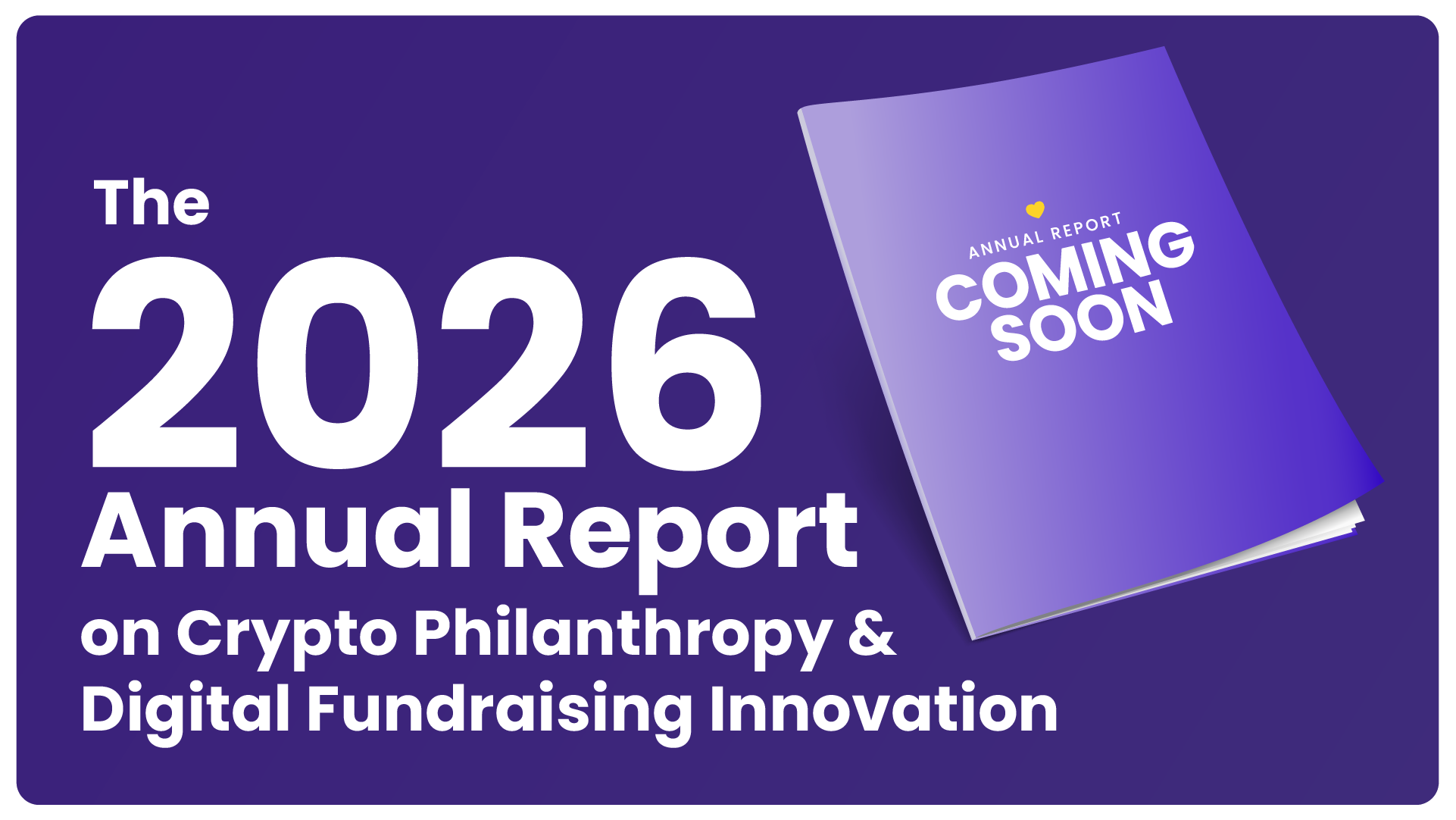In 2020, Donor-Advised Funds (DAFs) showed historic, all-around growth. The number of individual DAF accounts in the U.S. surpassed 1 million for the first time ever, DAF donors granted 27% more funds to nonprofits ($34.67 billion), and the DAF payout rate was the highest recorded in history at 23.8%, according to the National Philanthropic Trust.
There were also reported increases in overall contributions to DAFs, and the number of charitable assets contributed. Aside from confirming that DAFs are strongly committed to supporting nonprofits, the stats here also show that donors are hungry to contribute to DAFs like never before.
What’s really interesting is to stack the donor intent for DAFs up next to some of the trends we see with cryptocurrency and crypto donations:
- 94% of crypto users are Millennials and Gen Z, with robust participation from Gen X as well
- 95% of hedge funds are investing in crypto over the next five years
- The average crypto donation gift size is $10,500
- There are 400,000 crypto users for every one nonprofit accepting crypto donations
This spells massive upside potential for DAFs that want to break into the cryptocurrency arena, begin accepting crypto donations from their donors, and convert them to cash grants for nonprofits. But before we dive into how crypto could impact DAFs, let’s quickly review what DAFs are, how they work, and what benefits they offer.
What Are Donor-Advised Funds?
At its simplest, a DAF is a giving account that’s been established at a public charity. It provides socially conscious investors a way to make charitable contributions, receive an immediate income tax benefit, and make recommendations on where to grant funds over time.
Donors can contribute to a DAF as often as they like and recommend grants whenever it suits them best. But DAFs are irrevocable funds, which means that once a donation is made it can’t ever be withdrawn. It can, however, be easily transferred to another DAF account.
When it comes to the type of contribution, donors have the option to donate money, real estate, stock, or other complex assets. Typically, complex assets are the most effective way to give to a DAF, since the nonprofit is the one who will dispose of the asset. That way, the donor can avoid capital gains taxes and ultimately contribute a higher value gift with a lower cost of giving.
Today, we also see donors contribute their cryptocurrency to DAFs, which is either converted to cash and invested, or deposited into the DAF without being liquidated. There are few charitable giving options in the world that provide the level of versatility, flexibility, and tax efficiency that DAFs do.
How Do Donor-Advised Funds Work?
A donor can make a gift to a sponsoring charity, which establishes a DAF on their behalf. The funds contributed to the DAF are invested, and the return on that investment is used to issue grants to various nonprofits.
Typically, after the DAF is funded, the donor provides recommendations on which organizations should receive grant funding. Often, the entity overseeing the management of the DAF will vet the nonprofits to ensure they’re an IRS-recognized 501(c)(3). Once that’s confirmed, a check is sent to the nonprofit.
Once the DAF is established, a donor can contribute to it as often as they want. Donors also have the option to immediately grant from their account, delay their giving, or set up recurring grants. These powers of choice remain with the donor for life and can be passed down to designated members of future generations.
What Are the Benefits of Donor-Advised Funds?
Donor-advised funds are one of the fastest-growing trends in philanthropy. The most frequently discussed benefits of DAFs are related to financials, like tax deductions and capital gains tax mitigation. While these are certainly appealing, many donors have recently stated that the real value they get from their DAF is the impact they make through their contributions.
Looking for a real-world example? Search no further than this recent instance of a donor anonymously depositing crypto valued at $1.2M into a DAF managed by Austin Community Foundation, which will be distributed to several nonprofits over the coming years.
The beauty of a DAF is that it delivers strongly on both fronts here. On top of these factors, there are additional benefits associated with DAFs you should be familiar with before getting involved.
1. Taxes
When a donor contributes to a DAF, they get an immediate tax benefit. If they choose to contribute stocks, mutual funds, or exchange traded funds (ETFs), they also avoid capital gains taxes when the nonprofit sells these assets.
2. Investment and Distribution Flexibility
Donations to a DAF can be made at any time and can be any size. Further, they can be sent out as quickly or slowly as a donor chooses. Last, donors can recommend that funds be granted to a wide variety of nonprofit organizations.
3. No Administrative Burdens
Because the assets that you contribute to a DAF are no longer owned by you, you’re not responsible for any administrative matters associated with them. For example, you don’t need to worry about record-keeping or tax reporting.
4. Family Giving Legacy
Donors retain the power to recommend which nonprofits receive grants from the DAF for their entire life. This ability to make grant recommendations can be shared with, and passed on to, family members and future generations. In that light, the DAF can establish a legacy of giving that goes beyond a single lifetime and makes an impact over countless generations.
5. Diversity of Assets
Contributions to DAFs can be made with cash, stocks, real estate, bonds, and ETFs. Now, donors can even donate their cryptocurrency to their DAF. Whether you hold traditional stocks or newer cryptocurrencies like Bitcoin, Ether, or Dogecoin, you’ll have the opportunity to grant funds to a nonprofit of your choice.
How Does Crypto Factor into Donor-Advised Funds?
Much like we’ve seen with DAFs, cryptocurrencies have experienced rapid growth in recent years. Look no further than the number of people taking an active interest in crypto, which is now more than 295 million users worldwide, and or global market cap of over $1.1 trillion.
Crypto is the best performing asset class of the last decade. With Bitcoin’s market cap on track to eclipse silver, nonprofit institutions like DAFs, Foundations, and Universities are faced with a choice: accept cryptocurrency or get left behind.
Although crypto has taken some time to find mainstream acceptance, it is undoubtedly a viable asset with real-world cash value. In fact, we’ve seen nonprofits receive staggering crypto donations:
- CARE.org partnered with the NFT for Afghanistan Campaign that netted $190,000 in crypto donations
- Orangutan Outreach received a 169 ETH ($389,000) donation from the Bored Ape Yacht Club
- Trees for the Future received a 73.824 ETH ($217,000) donation as part of the Woodies NFT campaign
Crypto donations have exploded as countless donors look for new ways to make an impact with the various coins they have in their possession. And now, just like stocks, real estate, or cash, crypto users are learning they can donate crypto to a DAF.
The diverse range of contributions a DAF will accept allows for more giving to nonprofits. And given the fact that younger generations are heavily invested in crypto, it also opens up access to new cohorts of future-proof donors that have immediate value, today, across the world.
Trend: Crypto-Enabled DAFs for Universities and Higher Ed Institutions
Recently, eleven institutions in the University of North Carolina system enabled cryptocurrency donations into their DAF programs.
“The ability to accept new types of assets is vital to the growth of our system-wide program. Cryptocurrency is an asset that is growing and we want to make sure our donors can utilize those assets in meeting their philanthropic goals through use of their Donor-Advised Funds,” said Kinna Clark, Director of Planned Giving Services for the University of North Carolina.
As more DAFs accept crypto contributions, it also empowers more nonprofits to familiarize themselves with crypto and accept crypto donations. Already, hundreds of millions worth of cryptocurrency have been donated to charities. In 2021, Fidelity Charitable had processed more than $331 million in digital asset donations alone—a year-on-year increase of over 1,000 percent.
Given this trajectory, it’s entirely possible that cryptocurrency emerges as one of the main pillars that fuels philanthropy as it progresses into the future.
How to Create or Support a Crypto Donor-Advised Fund
The Giving Block wants to make cryptocurrency fundraising easy for all nonprofits. In the spirit of that mission, we partnered with RenPSG to cement crypto as a permanent part of the DAF landscape.
We both noticed that the charitable giving landscape was changing as crypto donations exploded and nonprofits began to see the massive potential inherent in crypto. So, our strategic partnership allows donors to easily move crypto assets into new or existing DAFs.
If you’ve already got a DAF, reach out to your program manager and ask if they will accept crypto contributions. If they don’t, remember that you can easily transfer assets between existing DAFs.
So, you could donate crypto assets to one of the DAFs set up through The Giving Block’s partnership with RenPSG. From there, you can transfer the funds into another DAF and grant them to a nonprofit of your choice.
The other option is to create a new DAF that’s built with crypto in mind. Depending on the complexity of the gifted assets, you could likely establish a new DAF in just a matter of days.
New for 2022: Contribute Your Crypto Assets into DAFs Without Liquidating
Until recently, Donor-Advised Funds, which are giving accounts where donors contribute assets and recommend grants to qualified charities, could receive crypto, but the crypto was liquidated upon receipt. But the cryptocurrency market is maturing, and we’re seeing more sophistication at both the user base and with crypto product providers.
With this evolution in mind, The Giving Block and Ren now offer donors the ability to contribute crypto without liquidating all of these digital assets for cash.
Learn More About Crypto and Donor-Advised Funds
There’s no need to feel overwhelmed or intimidated by DAFs. They’re not only for high net worth individuals or those fluent in complex finances. DAFs can be established by anyone with relatively low investments, and they actually make long-term charitable giving simple.
The only thing that’s necessary to successfully create a DAF is passion to make an impact with a variety of causes and nonprofits. If you’re interested to learn more about how you can use crypto to create a DAF or support an existing one, reach out to our team—we’d love to talk with you.
Explore Crypto Giving Options & Tax Services
There’s no better time to consider creating a Donor-Advised Fund than the present. If you want to learn how to maximize your giving potential and save on taxes by donating your crypto gains to charities, set up a time to talk with The Giving Block about cryptocurrency DAFs today.




















